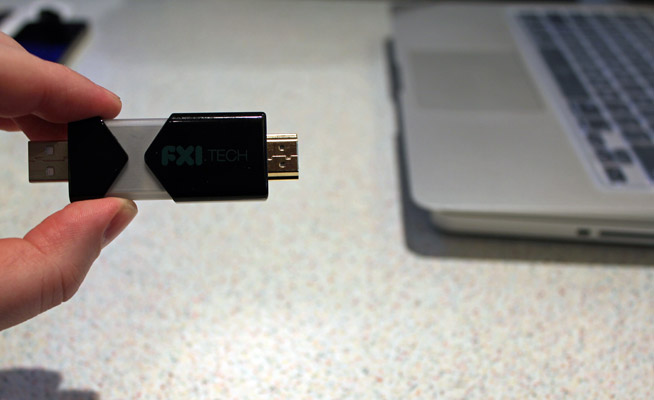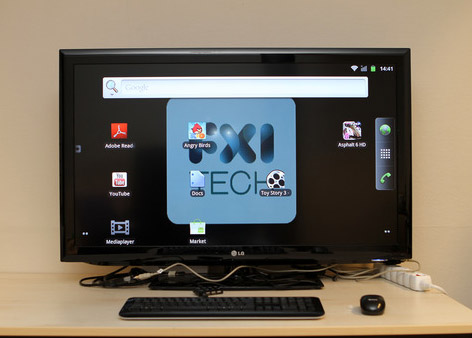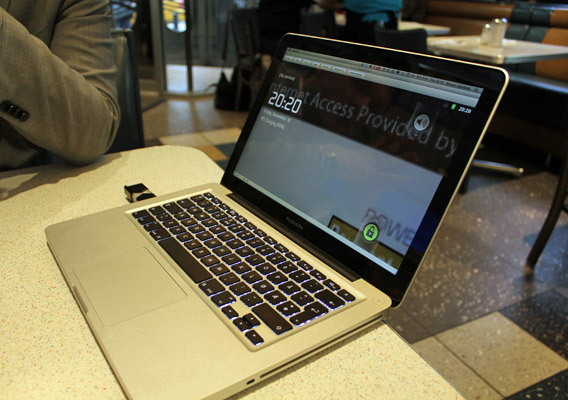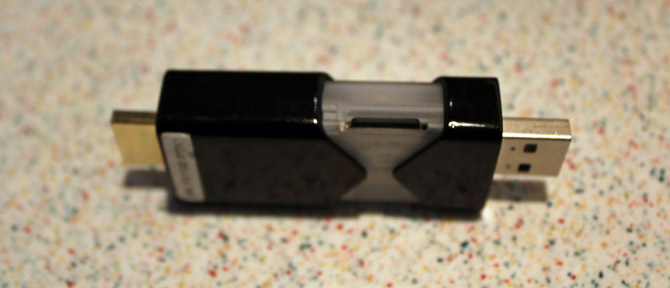USB Stick Contains Dual-Core Computer, Turns Any Screen Into an Android Station
Is that a USB key in your pocket or a dual-core computer? Today, Norwegian company FXI technologies showed off a USB stick-sized portable computer prototype, complete with a dual-core 1.2-GHz Samsung Exynos ARM CPU (same as in the Galaxy S II), 802.11n Wi-Fi, Bluetooth, HDMI-out and a microSD card slot for memory. Codenamed Cotton Candy because its 21 gram weight is the same as a bag of the confection, the tiny PC enables what its inventor calls "Any Screen Computing," the ability to turn any TV, laptop, phone, tablet, or set-top box into a dumb terminal for its Android operating system.
Update: Detailed Tests of Cotton Candy
The Cotton Candy has a USB 2.0 connector on one end and an HDMI jack on the other. When connected to an HDTV, it uses the HDMI port for video, the USB for power, and Bluetooth to connect to a keyboard, mouse, or tablet for controlling the operating system. The device can output up to 1080p so even a full HD screen can display the Candy's preloaded Android 2.3 operating system at its native resolution. The dual core CPU is powerful enough to play local 1080p video or stream HD clips from the Web. Learn more and see our hands on video below.
When you plug the Cotton Candy into a Mac or PC, the Windows or OS X operating system recognizes it as a USB drive. You can then launch the software and run the Cotton Candy's Android environment in a secure window while you use your desktop OS outside the window. You can even transfer files between your notebook's native OS and the Cotton Candy's Android environment by dragging them off or on the USB stick's memory.
We watched as FXI CEO Borgar Ljosland popped the Cotton Candy into his MacBook Pro and, within seconds, had the device's Android OS running in a full screen window and, though we didn't get to play with the device ourselves, we were impressed with how quickly it started up. Borgar told us that Android developers can use this environment to test out their apps while they work on code in another window.
HDTVs, monitors, and computers are just the tip of the iceberg for the Cotton Candy. Borgar told us the device will be able to connect to tablets, smartphones, and even set top boxes via USB or Bluetooth. He says that he expects the device to be able to turn even an iPhone or an iPad into a terminal for its environment. Imagine an iPhone running Android!
Because the Cotton Candy is a full-fledged computer, it should be able to plug into a USB hub and connect directly to a monitor, keyboard, and mouse to launch its OS. Offices or schools could set up docking terminals to support users who carry it in their pockets.
Sign up to receive The Snapshot, a free special dispatch from Laptop Mag, in your inbox.
Cotton Candy's purpose is to provide a computing experience that users can carry with them and replicate anywhere they go. Imagine walking into an Internet cafe or a business center, popping your Cotton Candy into a USB port, and having your own operating system and applications take over the device.
Though the current prototype runs Android 2.3, Borgar told us that the ARM-based hardware can run Ubuntu Linux currently and future versions should be able to run the ARM version of Windows 8. Future versions of the device will have a USB 3 connector and faster processors.
From developers to students to mobile workers, there are a number of groups that could find innovative ways to use a computer the size of a USB stick. However, you won't see a consumer product shipping anytime soon from FXI. The company plans to sell the Cotton Candy to developers and let OEMs license the technology and turn it into something that can appeal to a wide audience.
Borgar does not expect these future "any screen" products to replace your primary PC or smartphone, but says they could become popular secondary devices. With Ubuntu installed, the Cotton Candy can even be turned into a mobile file or web server!
FXI hasn't set pricing yet for the Cotton Candy, but expects it to cost considerably less than $200 per unit. That's not bad for a full-fledged computing device the size of a cigarette lighter.





